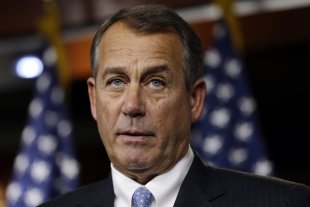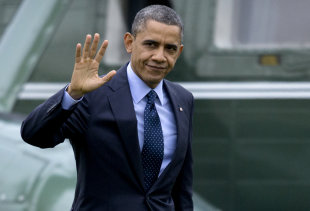 House Speaker Rep. John Boehner, R-Ohio, speaks to the media about the fiscal cliff at the U.S. Capitol in Washington. …In a stinging setback for Republican House Speaker John Boehner, a lack of support from inside his own party for his “fiscal cliff” fall-back plan forced him late Thursday to cancel a much-trumpeted vote on the measure.
House Speaker Rep. John Boehner, R-Ohio, speaks to the media about the fiscal cliff at the U.S. Capitol in Washington. …In a stinging setback for Republican House Speaker John Boehner, a lack of support from inside his own party for his “fiscal cliff” fall-back plan forced him late Thursday to cancel a much-trumpeted vote on the measure.
“The House did not take up the tax measure today because it did not have sufficient support from our members to pass,” Boehner said in a written statement released after an emergency meeting of House Republicans.
The measure, dubbed “Plan B,” would have let Bush-era tax cuts expire on income above $1 million annually, while extending them for everyone else. It appeared that Boehner faced a rebellion from conservatives opposed to any tax hike, while House Democrats starved the bill of their support, making passage impossible.
Boehner’s dramatic defeat cast fresh doubt on efforts to avert the “fiscal cliff” and spare Americans across-the-board income tax hikes come Jan. 1. Those increases, coupled with deep automatic spending cuts scheduled to take effect the same day, could plunge the fragile economy into a new recession. Talks between the speaker and President Barack Obama were at a stalemate, according to aides on both sides.
After the cancellation of the vote, Republican House Majority Leader Eric Cantor announced on Twitter the House "has concluded legislative business for the week. The House will return after the Christmas holiday when needed."
Boehner’s “Plan B” had aimed to shift any blame for going over the "fiscal cliff" to Obama and Senate Democrats led by Harry Reid. Polls show a narrow majority of Americans say they would hold the GOP responsible if a deal is not reached to avert the "cliff."
“Now it is up to the president to work with Senator Reid on legislation to avert the fiscal cliff,” the speaker said. He pointed to House passage of Republican bills that would stop all of the tax increases and replace the automatic cuts. “The Senate must now act.”
White House press secretary Jay Carney said in a statement Thursday night that Obama's "main priority is to ensure that taxes don’t go up on 98 percent of Americans and 97 percent of small businesses in just a few short days. The president will work with Congress to get this done and we are hopeful that we will be able to find a bipartisan solution quickly that protects the middle class and our economy."
The vote had initially been scheduled for 7:30 p.m. But House Republican leaders’ vote counting showed up coming up short. Rather than suffer a defeat in a floor vote, they pulled the bill.
Earlier, the White House had pressed Boehner to stick with negotiations with Obama and threatened to veto “Plan B,” which top Senate Democrats mocked as “dead on arrival” in the upper chamber.
“Instead of taking the opportunity that was presented to them to continue to negotiate what could be a very helpful, large deal for the American people, the Republicans in the House have decided to run down an alley that has no exit while we all watch,” Carney told reporters.
He also indicated that communications, even at the staff level, were on hold.
 President Barack Obama waves to the media as he walks from Marine One to the Oval Office of the White House (Carolyn …One early sign of trouble for Boehner came in a too-narrow-for-comfort vote victory on the second part of his plan, which would have replaced the automatic cuts in defense and domestic spending–the so-called “sequester”–with a Republican alternative. That measure passed by a 215-209 margin.
President Barack Obama waves to the media as he walks from Marine One to the Oval Office of the White House (Carolyn …One early sign of trouble for Boehner came in a too-narrow-for-comfort vote victory on the second part of his plan, which would have replaced the automatic cuts in defense and domestic spending–the so-called “sequester”–with a Republican alternative. That measure passed by a 215-209 margin.
Before that, lawmakers had defeated a Democratic attempt to derail the process by a 179-243 margin.
The “Plan B” push had pitted Boehner against conservative groups like the anti-tax Club for Growth and Heritage Action–which warned lawmakers the results would go on their permanent records.
But even a victory for Boehner would have been mostly symbolic.
Democratic Senate Majority Leader Harry Reid offered the “fiscal cliff” equivalent to Monty Python’s “dead parrot” sketch, dismissing "Plan B" as a “pointless political stunt,” declaring that Boehner’s efforts were “non-starters in the Senate” and insisting that “House Republicans know that the bill has no future.”
“If they don’t know it now, tell them what I said,” Reid said. “It’s time for Republicans to get serious” about negotiating with Obama. (Anyone still think the parrot is just resting? No. 2 Senate Democrat Dick Durbin bluntly declared “Plan B” to be “dead on arrival.”)
Reid also announced that the Senate would be back at work on Dec. 27. (Earlier, Republican House Majority Leader Eric Cantor said representatives would not leave town immediately after the "Plan B" vote.)
Boehner shrugged off Reid’s comments.
“After today, Senate Democrats and the White House are going to have to act on this measure,” he told reporters. “And if Senate Democrats and the White House refuse to act, they’ll be responsible for the largest tax hike in American history.”
Boehner had declared himself “hopeful” that he and Obama can reach a broader deal and insisted he was “not convinced at all that when the bill passes the House today it will die in the Senate.”
The White House, which had already leveled a veto threat, blasted “Plan B” in a blog post as “nothing more than a dangerous diversion” that scraps funding for services like Meals on Wheels, which reaches some 1.7 million elderly people, as well as child care programs and initiatives that help homeowners prevent foreclosure.
Some analysts had noted that Obama and Boehner were just a few billion dollars apart and that “Plan B” could turn out to the be the legislative vehicle for any final compromise deal.
“We will have to be here the 27th no matter what happens,” Democratic Sen. Chuck Schumer said. “If there’s no agreement we have to be here to try and hammer out something. If there is an agreement it’ll take several days to write it up–our poor staffs will have to be doing it during the holiday–and then vote on it the 27th.”
Democrats argued that Obama’s latest offer to Boehner included a sizable concession. The president said Monday that he’d accept rates going up on household income above $400,000, rather than $250,000, the number he cited throughout his reelection campaign.
Obama's new proposal also calls for raising $1.2 trillion in new tax revenues on individual income–down from $1.4 trillion in his previous proposal and $1.6 trillion in his opening gambit–coupled with about $1 trillion in spending cuts. The president’s proposal includes about $130 billion saved by adopting lower cost-of-living adjustments for Social Security, something liberal Democrats oppose.
Republicans charged that the president was relying on dodgy math by including interest that won’t have to be paid on the national debt thanks to the savings–even though Boehner has embraced that accounting maneuver in the past.
Early in the day, Boehner himself had rejected charges that “Plan B” showed that he feared he would be unable to rally enough Republicans behind a more comprehensive deal.
“Listen, the president knows that I’ve been able to keep my word on every agreement we’ve ever made,” he said.
Boehner suffers major 'fiscal cliff' setback
This article
Boehner suffers major 'fiscal cliff' setback
can be opened in url
http://healthnewstar.blogspot.com/2012/12/boehner-suffers-major-cliff-setback.html
Boehner suffers major 'fiscal cliff' setback










